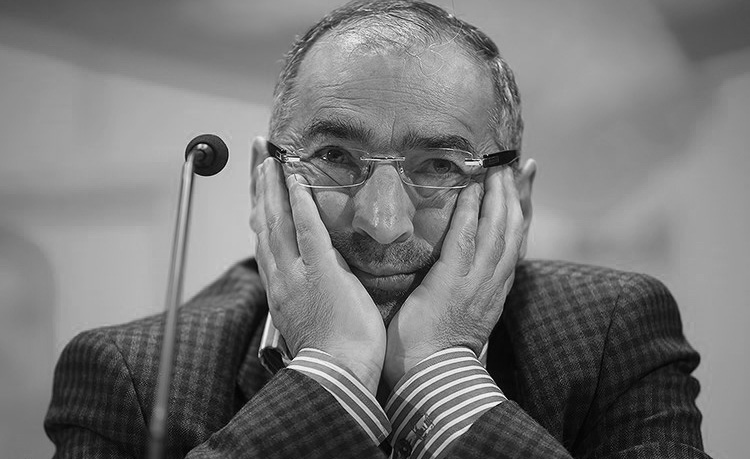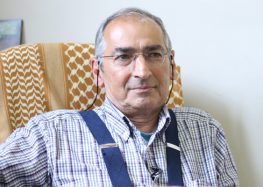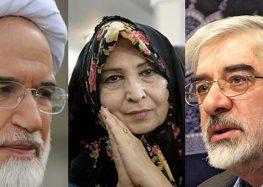Political Pundit Sadegh Zibakalam Faces Charges For Discussing Politicization of Iran’s Judiciary

Prominent reformist political analyst Sadegh Zibakalam has been slapped with the charges of “propaganda against the state” and “disturbing public opinion” after discussing the politicization of Iran’s judiciary with a foreign radio station.
Speaking in an interview with the Center for Human Rights in Iran (CHRI) on August 12, 2017, the Tehran University political science professor and former political prisoner said he was being prosecuted for comments he made during an interview about the recent detention of President Hassan Rouhani’s brother, Hossein Fereydoun.
“When Mr. Fereydoun was arrested after the [May 2017] presidential election, I gave an interview to the German state radio broadcaster, Deutsche Welle,” said Zibakalam. “I said that if the brothers of the French, German, Dutch or Japanese heads of state had been detained, we could say for certain that the charges against them were for financial crimes. But unfortunately, in Iran the judiciary’s actions have been so influenced by politics and political interference that we cannot say with one hundred percent certainty that a crime has truly taken place.”
Fereydoun, who serves as a close adviser to Rouhani, was detained on corruption charges on July 15, 2017 . He was released two days later on 50 billion tomans ($15.3 million USD) bail.
“There have been cases in the past which indicate that the judicial branch has lacked independence and bowed to the will of the state,” he said. “The revolutionary prosecutor has determined that my statements were slanderous attempts to turn public opinion against the judiciary, which is false.”
“I have never once heard the heads of the French or Japanese or British or German or American judicial systems make political statements,” Zibakalam told CHRI. “But in Iran, the judiciary chief only makes political statements, and whenever he is questioned about it, he accuses his critics of being mercenaries. When we see these things, we understand that my statements have not been far off the mark.”
Zibakalam told CHRI he received a summons from the Media Court in Tehran on August 10, 2017 to appear there two days later.
“When I went there, the court assistant Mr. Bijan Ghasemzadeh was very respectful and treated me like an academic, not a suspect,” he said. “Nevertheless, he had to do his job.”
“After two or three hours of questioning, I was told I was being charged with making propaganda and statements that disturbed public opinion against the judiciary,” he added. “I was told I could get legal representation, which I did, and for now I am free on bail until I am summoned for trial.”
In June 2014, Zibakalam was sentenced to 18 months in prison for criticizing Iran’s nuclear policy and the handling of financial corruption cases by the judiciary. His sentence was later reduced to a five million toman ($1,530 USD) fine.
Under the Pahlavi Dynasty, Zibakalam served two years and one month in prison for his membership in the outlawed Mojahedin-e Khalgh (MEK also known as MKO or PMOI) before his release in September 1976.
“Let’s assume I said the judiciary is not independent,” Zibakalam told CHRI. “That’s not insulting or slanderous. The judiciary can rule that that’s just my opinion and that the judiciary is indeed independent.”
“However, what I have said has not been far from the truth,” he added. “Other than bold political statements, I have rarely heard the judiciary chief make comments on judicial matters. He has commented on the nuclear issue, on relations with Saudi Arabia, on issues with the US as well as on internal dissent.”
“He acts more like the head of a political party, or a state spokesman or foreign policy official than someone in the exalted position of the head of the judiciary,” added Zibakalam.
Asked about his prosecution in 2014, Zibakalam said charges were brought against him after he attacked critics of the Iranian nuclear deal and sought answers from the judiciary over the death sentence issued to a prominent Iranian entrepreneur who was executed in 2011.
“Before the agreement [nuclear deal] came about, I wrote an open letter to those who defended Iran’s nuclear program and asked them to list the economic benefits of the program,” he said. “Why don’t they tell people how much it costs to produce electricity at the Bushehr Nuclear Plant? Do people know that 50,000 people are employed by our Atomic Energy Organization? Do they know if it’s cost-effective?”
“Then I was attacked by Kayhan newspaper editor Hossein Shariatmadari who accused me of defending Amir [Mahafarid] Khosravi, who had been condemned to death in a $2.6 billion bank fraud case.”
“In my reply to Mr. Shariatmadari, I said I was not defending or attacking Khosravi. I just wanted to know what he had done to deserve the death penalty,” continued Zibakalam. “What damage had he caused to the economy? Because as far as I know, he was employing 18,000 people in his factories and companies when he was arrested and there was not a single case of money laundering against him.”
“All I asked was that the judiciary provide an explanation about the case, but the prosecutor filed charges against me and accused me of propaganda against the state and undermining the country’s nuclear industry and defending criminals,” he added.
“I don’t know where the latest charges against me will lead to, but the process has been the same,” Zibakalam told CHRI.


